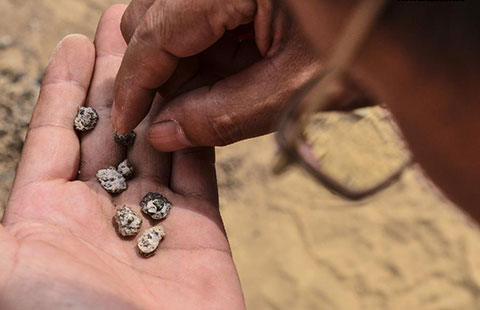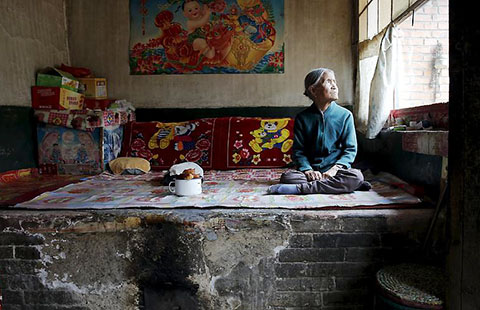Former loggers turning over new leaf
Updated: 2015-08-17 11:09
By He Na(China Daily)
|
||||||||
|
Yichun, also known as China's "forest capital", is now a destination for tourists. ZOU HONG/CHINA DAILY |
Lines of neat, white houses stand at the foot of a mountain at Xiling Forest Farm in Yichun. The houses have all been fitted with modern amenities such as indoor plumbing, heating and private yards-a far cry from just three years ago, when the place appeared to be abandoned.
"When we had less and less work to do in the forestry bureau in 1990s, everyone wanted to sell their house and move outside or find jobs in other industries," said Jin Feng, deputy director of the farm, located in Wumahe Forest District.
Jin offered to sell his 49-square-meter house, which was considered the best in the area, for 2,000 yuan per sq m, but there were no takers.
"We owe thanks to Gong Baomin, the president of Baoyu State Real Estate Development Group, who was born in Xiling, and responsed to the dilemma facing the local people. The company not only helped us rebuild our houses, but also invested in tourism projects, such as hotels, hot springs and other entertainment facilities," he said.
"Of Xiling's 1,750 registered residents, no one is unemployed, except for a small number of lazy people who just don't want to work," Jin said.
Xiling was lucky that assistance was offered at exactly the right time, but few other districts have been as fortunate. Most have had to rely on their own efforts to create new jobs.
Wang Xianjun, general manager and a co-founder of Yichun Jinrui Forest Food Co, has had a roller coaster ride in the past decade. As director of a timber mill in Hongxing district, Wang was in charge of more than 100 workers who processed, classified and transported the timber. When the mill closed, he found himself unemployed.
"Yichun is the national base for timber and we are really proud to have supported the country's economic development in the early years," he said. "But the good days ended in the 1990s. Every day, I was very disappointed because I had no way of handing out salaries to the workers," he said.
"Sometimes, when people feel cornered they are inspired and their potential shines through. We considered many lines of business, and eventually we decided to produce edible mushrooms. It's been hard, though-it's not easy for people who were good at using axes and saws to work in a new profession," he said.
After three years in business, Jinrui is one of the largest producers of edible mushrooms in Yichun, but as industry newcomers, the workers and management had to learn everything from the bottom up. "To us, the factory is our baby. We failed so many times, and the road to getting the factory up and running was full of hardships," Wang said.
The company guarantees quality produce, so it focuses on the high-end market-its most expensive mushrooms retail at 1,600 yuan a kilogram-and the brand has already attracted a loyal fanbase.
"Demand kept rising, so we decided to outsource some of the work to individuals, who grow mushrooms to supplement our factory production. We're very proud to say we help about 1,000 households to earn a stable income every year," Wang said.
The subcontractors buy bags containing spores and fungi and, after a few days of training, they begin cultivating mushrooms at home.
"The use of fertilizers and pesticides is strictly prohibited, and we have strict testing measures when we collect the mushrooms from households. As long as the fungi is untainted, we will collect it all, and the householders don't need to worry about sales," he said.
Other locals have started similar businesses raising pigs, deer and collecting wild vegetables, and now China's largest bluberry-cultivation project has been established in Youhao district.
"Yichun is at a similar altitude to the major blueberry production bases in the United States and Canada. With an annual yield of 30,000 metric tons, the project has helped more than 1,000 people find jobs," Yang Jianzhong, the director of the base, said.
Former forest ranger Xu is one of the "blueberry beneficiaries"; she has found work as a cleaner at the center and can earn as much as 2,000 yuan a month. "It's a relief. The future is looking brighter, now, and I'm very happy to know I can stay in the forest with my family," she said.
Zhou Huiying contributed to this story.
- IS likely uses mustard agent in Iraq attack
- Fidel Castro marks 89th birthday with surprise visit
- Switzerland begins public consultations on joining China-led AIIB
- Malaysia seeks increased trade ties with China
- China salutes veterans of anti-Japanese aggression war
- 5 Japanese ex-PMs show concerns over security bills

 Times Square 'Kiss-In'
Times Square 'Kiss-In'
 School turns into place of shelter in Tianjin
School turns into place of shelter in Tianjin
 Earliest site of coal fuel found in Xinjiang
Earliest site of coal fuel found in Xinjiang
 Top 10 Chinese cities with highest property prices
Top 10 Chinese cities with highest property prices
 Comfort women: Scars have not been healed
Comfort women: Scars have not been healed
 Top 10 places to visit in Tibet
Top 10 places to visit in Tibet
 8 groups yuan depreciation will impact most
8 groups yuan depreciation will impact most-
 Historic kiss on grand scale
Historic kiss on grand scale
Most Viewed
Editor's Picks

|

|

|

|

|

|
Today's Top News
New York event marks war anniversary
Li, 24, runs for House
China, US engage in human rights
China investigates Tianjin blasts, experts focus on chemicals
PBOC promises effective steps for yuan stability
US oil slides to six-and-a-half year low under $42 as stocks build
US believes IS likely uses mustard agent in Iraq attack
12 firefighters among 44 killed in Tianjin explosions
US Weekly

|

|






